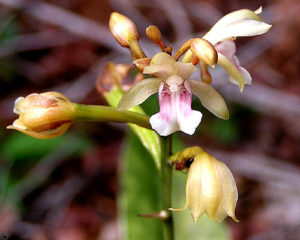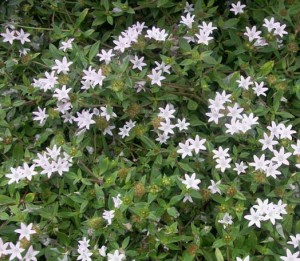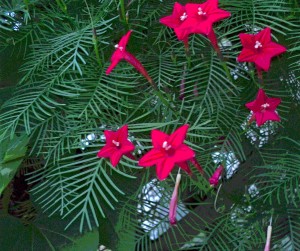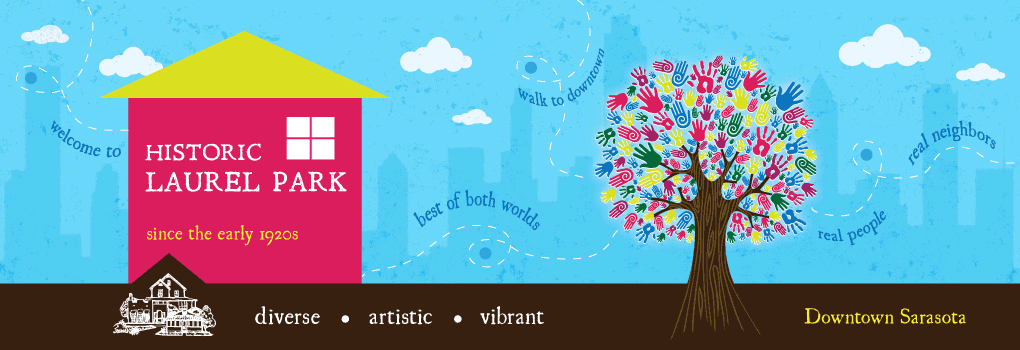Naturalized migrant plant species in our neighborhood should be welcomed
Over the past several years, I have noticed the slow proliferation of three interesting plant species that, although easily overlooked by many and considered “weeds” by some, deserve close-up attention and appreciation.
Monk Orchid
 “Monk Orchid” or “African Spotted Orchid” (Oeseoclades maculate) grows in shady, dry conditions and will appear randomly out of thick, undisturbed oak leaf groundcover where their spores have come to rest. Most botanists agree they originated in west Africa and traveled by winds across the Atlantic to South America and upward to the Caribbean and to South Florida. Like the white Cattle Egret and Flamingo, two bird species that originated in Africa, they are now considered by many to be naturalized here.
“Monk Orchid” or “African Spotted Orchid” (Oeseoclades maculate) grows in shady, dry conditions and will appear randomly out of thick, undisturbed oak leaf groundcover where their spores have come to rest. Most botanists agree they originated in west Africa and traveled by winds across the Atlantic to South America and upward to the Caribbean and to South Florida. Like the white Cattle Egret and Flamingo, two bird species that originated in Africa, they are now considered by many to be naturalized here.
Mexican Clover
 “Mexican Clover” (Richardia grandiflora) is a low-growing ground cover which, when blooming (most of the year), creates a beautiful carpet of pale lilac-pink flowers. This quickly-spreading plant grows from seed and runners and could become a welcome, low-maintenance replacement for small lawns. It requires no mowing and takes moderate foot-traffic while being moderately drought tolerant. The most outstanding example in our neighborhood is on the northwest corner of Oak Street and Lafayette Place, where it continues to thrive and spread throughout the entire lawn areas of partial shade and full sun.
“Mexican Clover” (Richardia grandiflora) is a low-growing ground cover which, when blooming (most of the year), creates a beautiful carpet of pale lilac-pink flowers. This quickly-spreading plant grows from seed and runners and could become a welcome, low-maintenance replacement for small lawns. It requires no mowing and takes moderate foot-traffic while being moderately drought tolerant. The most outstanding example in our neighborhood is on the northwest corner of Oak Street and Lafayette Place, where it continues to thrive and spread throughout the entire lawn areas of partial shade and full sun.
Cypress Vine
 “Cypress Vine” (Ipomoea quamoclit) is a member of the “Morning Glory” group and a favorite of hummingbirds and flower lovers because of their small, crimson-red, star-shaped flowers. The common name describes the fine, fern-like foliage similar to that of our native Cypress trees. This delicate yet tenacious little vine will quickly spread by entwining itself on any nearby structure or plant. It is a “new world” tropical whose natural range is northern South America to Mexico and will appear in cooler climates by re-seeding itself as an annual. Seeds are sold on the internet and may be available locally. Call me at 366-0639.
“Cypress Vine” (Ipomoea quamoclit) is a member of the “Morning Glory” group and a favorite of hummingbirds and flower lovers because of their small, crimson-red, star-shaped flowers. The common name describes the fine, fern-like foliage similar to that of our native Cypress trees. This delicate yet tenacious little vine will quickly spread by entwining itself on any nearby structure or plant. It is a “new world” tropical whose natural range is northern South America to Mexico and will appear in cooler climates by re-seeding itself as an annual. Seeds are sold on the internet and may be available locally. Call me at 366-0639.
There are many other, equally interesting plants – aka “weeds” – that grow in lawns and open areas that, upon close observation and, if kept safe from mowing, may be appreciated and allowed to flourish.
by Jack Notestein

